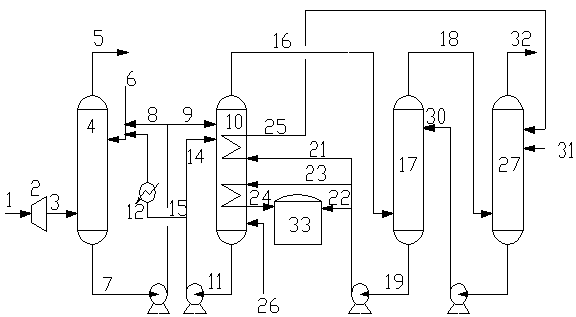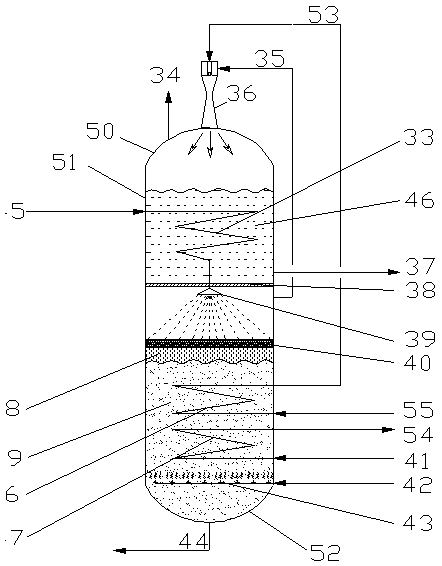Treatment process and system for acid gas
A treatment system and treatment process technology, applied in the direction of dispersed particle separation, chemical instruments and methods, separation methods, etc., can solve the problems of complex production equipment, high energy consumption of amine liquid regeneration, high safety control requirements of the equipment, and achieve environmental protection in the treatment process , the effect of reducing energy consumption
- Summary
- Abstract
- Description
- Claims
- Application Information
AI Technical Summary
Problems solved by technology
Method used
Image
Examples
Embodiment 1
[0085] Acid gas volume Q=550Nm in a refinery 3 / h, pressure 0.8Mpa, where H 2 S volume fraction is 80%, CO 2 The volume fraction is 18%, and the remainder is hydrocarbons and other substances. use figure 1 The shown processing method and device process acid gas. Wherein, the hydrate decomposer adopts a conventional tank structure with heat exchange equipment inside, and the shell of the hydrate decomposer is provided with a stripping gas inlet pipeline.
[0086] The operating conditions and treatment effects during the treatment process are as follows: the hydrate working solution consists of water, SDS accounting for 0.02% of the aqueous solution, SDBS accounting for 0.05% of the aqueous solution, polyethylene glycol accounting for 10% of the aqueous solution, and water Composed of diesel oil with a volume ratio of 1 / 2 and Span (sorbitan fatty acid ester) emulsifier with a molar ratio of 0.8% to water. The acid gas is pressurized by the compressor to 1.2Mpa and then int...
Embodiment 2
[0088] Same as Example 1, the difference is that using figure 2 In the structure of the decomposer, the volume ratio of the hydrate heating section of the hydrate decomposer to the hydrate decomposition and gasification section is 1 / 1, the liquid holdup in the hydrate heating section is 1 / 2 of the volume of this section, and the hydrate The liquid holding capacity of the decomposing gasification section is 1 / 2 of the total volume of this section, and the rupture partition assembly in the hydrate decomposer adopts a screen structure with an average hole diameter of 5mm.
[0089] Due to the use of the preferred hydrate decomposing device provided by the present invention, two stages of high-efficiency cascade heat exchange are performed, and the heat of the entire process is rationally utilized, and the working fluid can be decomposed (regenerated) under the same hydrate decomposing operating conditions as in Example 1 ) is more complete, to achieve the same effect as in Exampl...
Embodiment 3
[0091] Same as Example 2, the difference is that the hydrate working fluid used is composed of water, SDS accounting for 0.02% of the mass fraction of the aqueous solution, SDBS accounting for 0.05% of the aqueous solution, diesel oil with a volume ratio of 1 / 2 to water, and Composed of Span (sorbitan fatty acid ester) emulsifier with a water molar ratio of 0.8%.
[0092] Under the same hydrate reactor operating conditions as in Example 2, the CO in the tail gas treated by the hydration reactor 2 The concentration is 72%; after the hydrate-rich working fluid is treated by the hydrate decomposer, the CO in the gas 2 Concentration > 4%, increased CO 2 form Na 2 CO 3 / NaHCO 3 The impact of substances such as NaHS on the continuous and stable operation of the NaHS production unit has increased the operational difficulty of the long-term operation of the device.
PUM
 Login to View More
Login to View More Abstract
Description
Claims
Application Information
 Login to View More
Login to View More - R&D
- Intellectual Property
- Life Sciences
- Materials
- Tech Scout
- Unparalleled Data Quality
- Higher Quality Content
- 60% Fewer Hallucinations
Browse by: Latest US Patents, China's latest patents, Technical Efficacy Thesaurus, Application Domain, Technology Topic, Popular Technical Reports.
© 2025 PatSnap. All rights reserved.Legal|Privacy policy|Modern Slavery Act Transparency Statement|Sitemap|About US| Contact US: help@patsnap.com


